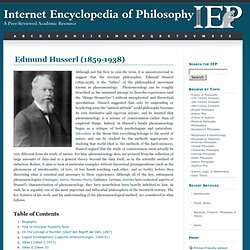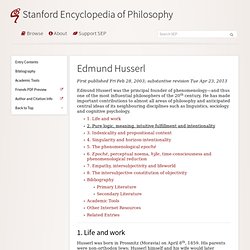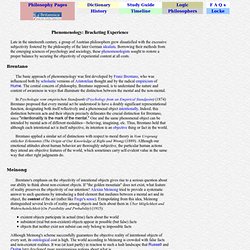

The Husserl Page. IEP on Husserl, Edmund Although not the first to coin the term, it is uncontroversial to suggest that the German philosopher, Edmund Husserl (1859-1938), is the “father” of the philosophical movement known as phenomenology.

Phenomenology can be roughly described as the sustained attempt to describe experiences (and the “things themselves”) without metaphysical and theoretical speculations. Husserl suggested that only by suspending or bracketing away the “natural attitude” could philosophy becomes its own distinctive and rigorous science, and he insisted that phenomenology is a science of consciousness rather than of empirical things.
Indeed, in Husserl’s hands phenomenology began as a critique of both psychologism and naturalism. SEP on Edmund Husserl. First published Fri Feb 28, 2003; substantive revision Tue Apr 23, 2013 Edmund Husserl was the principal founder of phenomenology—and thus one of the most influential philosophers of the 20th century.

He has made important contributions to almost all areas of philosophy and anticipated central ideas of its neighbouring disciplines such as linguistics, sociology and cognitive psychology. 1. Husserl Phenomenology Bracketing Experience. Phenomenology: Bracketing Experience Late in the nineteenth century, a group of Austrian philosophers grew dissatisfied with the excessive subjectivity fostered by the philosophy of the later German idealists.

Borrowing their methods from the emerging sciences of psychology and sociology, these phenomenologists sought to restore a proper balance by securing the objectivity of experiential content at all costs. Brentano The basic approach of phenomenology was first developed by Franz Brentano, who was influenced both by scholastic versions of Aristotelian thought and by the radical empiricism of Hume. The central concern of philosophy, Brentano supposed, is to understand the nature and content of awareness in ways that illuminate the distinction between the mental and the non-mental. Philosophical Dictionary: Husserl.